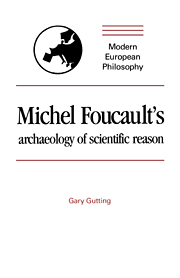Book contents
1 - Bachelard and Canguilhem
Published online by Cambridge University Press: 05 June 2012
Summary
Foucault himself emphasized the importance of Bachelard and Canguilhem not only for French thought in general but also for his own intellectual orientation. In an essay on Canguilhem, he proposes a fundamental division within post-World War II French philosophy between a “philosophy of experience, of meaning, of the subject and a philosophy of knowledge [savoir], of rationality, and of the concept.” The former he associates with the existential phenomenology of Sartre and Merleau-Ponty, the latter with the history and philosophy of science of Cavailles, Koyré, and especially Bachelard and Canguilhem. Foucault notes that this division can be traced back well into the nineteenth century, beginning with the opposition between Maine de Brian and Comte and continuing in the differences separating Lachelier and Courturat as well as Bergson and Poincaré. In the twentieth century, the division is reflected in the two different ways French thinkers appropriated the thought of Husserl after his Paris lectures in 1929. Cavaillés's “formal” reading in Méthode axiomatique and La formation de la théorie des ensembles. Whereas Sartre moves Husserl's thought forward to the concerns of Heidegger's Being and time, Cavaillés brings it back to its origins in the philosophy of mathematics. After World War II, the philosophy of the subject was inextricably tied to phenomenology in the work of Sartre and Merleau-Ponty.
- Type
- Chapter
- Information
- Michel Foucault's Archaeology of Scientific ReasonScience and the History of Reason, pp. 9 - 54Publisher: Cambridge University PressPrint publication year: 1989
- 3
- Cited by

